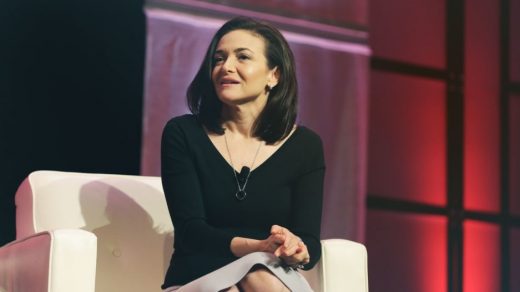At A Moment Of Crisis, Facebook Needs Sheryl Sandberg Out Front
Over the weekend it was business as usual on Facebook COO Sheryl Sandberg’s profile page. On Saturday, she shared two photos from a visit to her daughter’s elementary school. On Friday, she shared a New York Times article about the fifth anniversary of Lean In, the blockbuster book that made her a household name. “We still have a lot of work to do, but I’m proud that more women are speaking up,” she wrote. It was standard fare for the Silicon Valley billionaire, who often serves as the face of the company: a mix of cheerleading women in business and plugging her regular-mom bona fides.
Sandberg made no mention of another Times article, also published over the weekend, which detailed how “Trump Consultants Exploited the Facebook Data of Millions” and unleashed a still-growing firestorm in the U.S. and in Europe. On the surface, the news would appear to be a strong match for Sandberg’s much-lauded communication skills and years of policy experience in Washington, D.C. She was hired 10 years ago to serve as the so-called “adult supervision” (a characterization she dislikes), the critical No. 2 capable of bringing discipline and maturity to a fast-growing startup.
By nearly every measure, Sandberg has exceeded Wall Street’s expectations. But the Facebook COO has yet to directly comment on any recent reporting that has laid bare the ugly truth of the company’s advertising-based business model, which she is credited with building from scratch. CEO Mark Zuckerberg has also kept mum, but it’s Sandberg who many feel is best positioned to speak out. It is she who was once chief of staff to U.S. Treasury Secretary Lawrence Summers. It’s Sandberg who is a best-selling author, public speaker, Oprah interviewee, and public figure in her own right. And unlike many other second bananas, in Silicon Valley or elsewhere in corporate America, it’s Sandberg who has the chops and stature to lead Facebook out of the mess it’s in.
As Sandberg celebrates a decade with the company this Saturday, it’s hard to fathom why such a public, accessible face, at ease circulating in the highest levels of power in the worlds of government, business, and media, has gone along with a crisis strategy that puts herself (and her CEO) squarely behind the curtain.
The silent strategy is even more baffling given Facebook’s raison d’etre: Share! share! the company cries–all the better to target you. Facebook may cloak itself in the warm-fuzzies of baby pictures and birthday wishes, but each post and “like” feeds the insatiable appetite of the ad platform lurking underneath.
Perhaps it was inevitable that bad actors would seek to exploit such a vast trove of personal data. We have known for months that Russian operatives, 13 of whom were indicted in February by a federal grand jury, interfered in the 2016 presidential election; Facebook was the weapon of choice for their “information warfare.” And we are now learning how Cambridge Analytica used an academic researcher as a front for amassing profiles on 50 million Facebook users, later leveraging the data to sell its psychographic modeling expertise to political campaigns.
In retrospect, Facebook’s naiveté (and our own) is breathtaking. Build a surveillance state, and its power will inevitably be abused.
The Trust Factor
But the company’s disastrous response to the escalating crisis was not nearly so inevitable, experts say. Problem no. 1: Sandberg and Zuckerberg have been nearly invisible, sending deputies to speak on their behalf in front of Congress and on Twitter. They have even ghosted their own employees, failing to show at Tuesday’s town hall meeting, according to The Daily Beast.
“Unfortunately, they are the face of Facebook, they’ve branded themselves that way,” Monica Gabriell Wood, founder of crisis management firm MWPR, Inc., says of Sandberg and Zuckerberg. “It’s why there’s the expectation that they should be responding.”
Brands that survive a crisis have mastered the “trust factor,” Wood says. “It’s about how you build trust in the good days, when the apology isn’t needed. What has your brand done to show appreciation? It’s not something I can give examples to–it just has to come from the heart.”
Since the start of the year, Sandberg has shown appreciation to one constituency at least–advertisers. In a January 31 post on her profile page, she quickly glossed over 2017 as a “challenging and important year” before jumping to her small-business talking point. “It was also a year where more than 6 million active advertisers used Facebook and more than 2 million used Instagram every month,” she wrote. “Many are hard-working small and medium-sized businesses creating jobs and making a difference in their communities.”
Meanwhile, Sandberg has not made a public appearance to discuss the unfolding crisis since her interview with Axios founder Mike Allen last October. “Does Facebook owe the American people an apology?” Allen asked. Sandberg skirted the question: “Certainly any time there is abuse on our system, foreign interference on our system, we are upset, and it’s not just that we apologize, we are angry, we’re upset. But what we really owe the American people is determination. … we will do everything we can to defeat them because our values are worth defending.” She also called for setting “a new standard of transparency in advertising.”
But those ongoing efforts may prove to be too little, too late. Following the Cambridge Analytica revelations, some users are threatening to #DeleteFacebook–no idle threat, given the shift in momentum toward Lyft that #DeleteUber prompted last year. “The solution to being mistreated as a Facebook *customer* is to leave,” one user wrote on Tuesday in his final post. “As much as I’ve loved connecting and reconnecting with all of you—friends, colleagues, cousins and siblings–it’s not worth the flagrant disregard Facebook has shown for my personal data.”
In the past, Facebook user revolts centered around product updates (witness the infamous backlash to the launch of News Feed, way back in 2006). Product has historically been Zuckerberg’s domain, and, when necessary, he would respond on his page or some other public forum.
This revolt feels different. For the first time, users are up in arms over Facebook’s core business model. That’s Sandberg’s domain. Yet she has been invisible. There’s even a back and forth happening on Twitter about whether Facebook got the New York Times to erase a mention of her in an update to a story about internal criticism of outgoing chief information security officer Alex Stamos. (The Times is denying the allegations, but the mere speculation shows how much clout Sandberg is perceived to have.)
Far better to get out ahead of the problem and say something in the first 24 hours, says Olivia Santilli, vice president of strategy and media at Cummins & Partners. During a crisis, people are all ears. “Brands have this opportunity–people actually want to listen to them,” she says. The challenge is to strike the right tone: “When you have people that are so angry, you as a brand have to become more human.”
Given the time that has passed, a simple apology is no longer sufficient, in Santilli’s view. “For Facebook to make things better, they need to blaze a new trail now. They need to not only apologize, but make a really dramatic move.”
A Facebook spokesperson seemed to hint at the company’s intention to do just that in a statement that was provided to reporters (April 05, 2018). “Mark, Sheryl, and their teams are working around the clock to get all the facts and take the appropriate action moving forward, because they understand the seriousness of the issue,” the statement read. In the current information vacuum, one technology investor has suggested that Sandberg, a “better communicator,” take over as CEO. According to Axios, Zuckerberg plans to publicly address the crisis today or tomorrow.
As for Sandberg, when, or whether she will publicly comment remains unclear. For as long as she and Zuckerberg sit on the sidelines, meticulously planning their strategy, users and regulators will be at the table, venting their frustration and finding their voices. Given enough time, and enough silence, the public may begin to alter Facebook’s future in a way that, for the first time, could be beyond Sandberg and Zuckerberg’s ability to control.
(44)













